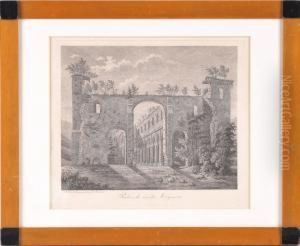Johann Georg Martini Paintings
Johann Georg Martini, also known as Giovanni Martini or Johann Paul Aegidius Martini, was a composer of classical music who is often confused with the more famous Giovanni Battista Martini, also known as Padre Martini. Johann Georg Martini was born on August 24, 1741, in Freystadt, Bavaria (now part of Germany). He was quite active in the second half of the 18th century, contributing to the music scene primarily as a composer.
Despite the common mix-up with Padre Martini, Johann Georg Martini was a significant figure within his own right, particularly known for his chamber music and songs. His most famous work is the song 'Plaisir d'amour,' which remains popular to this day and has been covered and adapted by numerous artists over the centuries. The melody is emblematic of the classical era's penchant for clear, lyrical lines and sentimental expression.
Martini's life, unlike that of many of his contemporaries, was not thoroughly documented, and as such, details about his personal life, training, and career trajectory are sparse. We do know that he worked in France for a significant portion of his life and was influenced by the French musical style of the period, which is reflected in his compositions. His works include instrumental music as well as vocal pieces, evidencing a versatile command of the musical language of his time.
Johann Georg Martini died on February 14, 1816, in Paris, France. Though he may not have achieved the lasting fame of some of his peers, his contributions to the classical repertoire, especially in the realm of vocal music, continue to be appreciated by musicians and audiences alike. His legacy is that of a composer who captured the elegant simplicity of the classical style and whose work has endured far beyond his own era.

